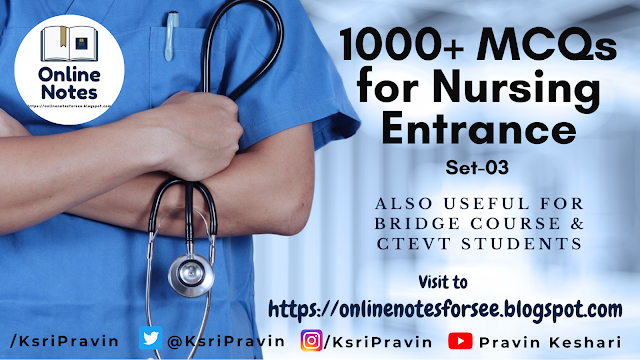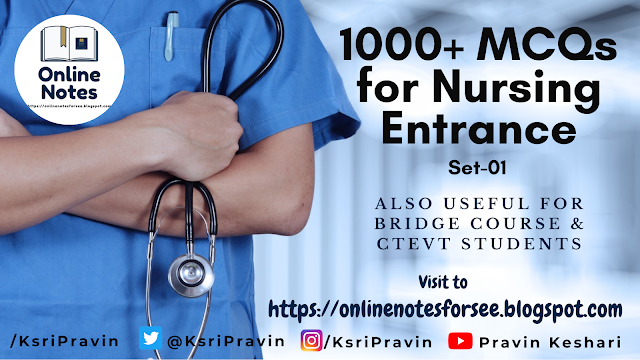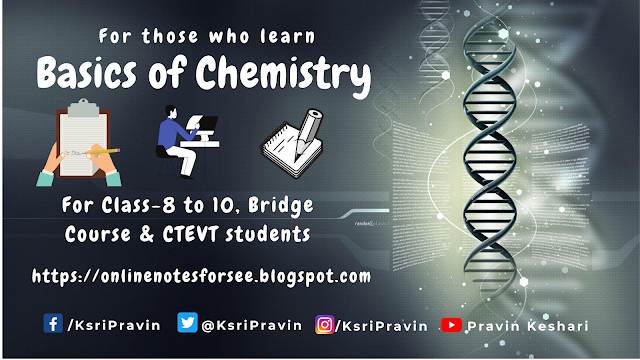1000+ MCQs for PCL Nursing Entrance Preparation || Part-03 ||
1000+ MCQs for PCL Nursing Entrance Preparation
Part-3
With the changing needs as well as Nepal, Government's health policy, CTEVT took an action to respond to these needs; as a result CTEVT has started the PCL Nursing course. PCL Nursing is one of the prominent and popular disciplines within the Nursing profession.
PCL Nursing has its full form of Proficiency Certificate Level in Nursing.

Haven't seen Part-1 and Part-2 yet???


In this particular series of "PCL Nursing Entrance Preparation", each set will contain 50 MCQs (with Answer key) for students to solve. About 1000 MCQs will be provided related with the entrance preparation for PCL Nursing or Staff Nurse. Notes will also be posted, if required.
If you find this blog useful after reading, do not forget to share it with your friends. Refer to your friends, so that they can also enjoy these questions.
Need full PDF syllabus of PCL Nursing???
Click on the icon below to download the full syllabus in PDF

Your MCQs for PCL Nursing starts from here:
1) Which sphincter guarded in between stomach and small intestine?
a) Sphincter Oddi
b) Intestinal sphincter
c) External sphincter
d) Pyloric sphincter
2) Fat digestion in human starts from......
a) Mouth
b) Stomach
c) Duodenum
d) Ileum
3) Which components is not formed in serum of blood?
a) Antibodies
b) Antigen
c) Microphages
d) Immunoglobulins
4) Which is the hardest tissue in human body?
a) Bone
b) Enamel of teeth
c) Dentine of teeth
d) Cartilage
5) Which teeth is not present in Temporary set of teeth?
a) Incisor
b) Canine
c) Pre-molar
d) Molar
6) Lactose is made of......
a) Fructose + Glucose
b) Glucose + Glucose
c) Glucose + Galactose
d) Glucose + Fructose
7) Which salivary gland is generally affected by Mumps?
a) Sub-lingual
b) Sub-Mandibular
c) Parotid
d) All
8) Which part of the digestive system's breadth is greater than length?
a) Caecum
b) rectum
c) Sigmoid colon
d) Duodenum
9) What is the function of intrinsic factor found in gastric juice?
a) Starts digestion of protein
b) Starts digestion of carbohydrate
c) Helps to absorption of Vitamin B₁₂
d) Helps to absorb all nutrient in large intestine
10) The hormone insulin was discovered by.....
a) Louis Pasture
b) Sir F. Huxley
c) Robert Hook
d) F. Banting
11) The part of the tongue more sensitive to sweet taste is.....
a) Sides
b) Tip
c) Base
c) Middle part
12) The enzyme which is present in pancreatic juice is.....
a) Ptyalin
b) Pepsinogen
c) Amylase
d) Renin
13) Which of the following enzyme does not assist in the digestion of carbohydrate?
a) Ptylin
b) Pepsin
c) Erepsin
d) Amylase
14) The total number of molar teeth in adult women has......
a) 6
b) 8
c) 12
d) 18
15) The feeling of drowsiness after food intake is due to.....
a) Increased blood flow to the intestine
b) Increased blood pressure
c) Increased blood flow to the brain
d) Increase activity of the liver
16) In children milk teeth eruption occurs at the age of.....
a) 6 month
b) 8 months
c) 12 months
d) 6 years
17) The process of splitting of Glycogen into glucose is known as.......
a) Glycogenolysis
b) Glyconeolysis
c) Glucaneogenesis
d) Glycogenesis
18) Esophagus pierces diaphragm at the level of.....
a) T₄
b) T₈
c) T₁₀
d) T₁₂
19) Which of the following is not the function of Liver?
a) Plasma protein synthesis
b) Protein digestion
c) Bile formation
c) Urea formation
20) Taenia coli is characteristics of....
a) Esophagus
c) Duodenum
c) Jejunum
d) Large intestine
21) When bile pigment in blood is excessive, than that is called....
a) Cyanosis
b) Jaundice
c) Anemia
d) Cholesteatosis
22) How much amount of gastric juice is secreted by the stomach per day in a normal healthy man?
a) 0.5 liter
b) 1.5 liter
c) 2.5 liter
c) 3.5 liter
23) Which of the following organ does not have peristaltic movement?
a) Uretine tube
c) Intestine
c) Vas difference
d) Artery
24) The usual capacity of urinary bladder in human is....
a) 100 ml
b) 500 ml
c) 800 ml
d) 1200 ml
25) How much time is required for the kidney to filter all the blood volume present in the body?
a) 4 seconds
b) 30 seconds
c) 1 minute
d) 4 minutes
26) The normal glomerular filtration rate is....
a) 50 ml/min
b) 125 ml/min
c) 250 ml/min
d) 500 ml/min
27) One of the following is not the major function of the kidney....
a) Regulation of the water contents of the body
b) Elimination of waste product from the body
c) Destruction of toxin substances in the body.
d) Regulation of blood acidity & alkalinity.
28) The organ of the body is involved in the function of filtration.....
a) Kidney
b) Bladder
c) Liver
d) Brain
29) The condition in which kidney fails to form urine is called...
a) Dysuria
b) Anuria
c) Polyuria
d) Haematuria
30) Glucose is mainly absorbed in kidney by....
a) Glomerulus
b)Loop of Henley
c) Distal convulated tubule
d) Proximal convulated tubules
31) Ampulla of fallopian tube is important for....
a) Ovulation
b) Fertilization
c) Implantation
d) None of the above
32) After delivery, which hormone is responsible for production of milk?
a) Osterogen
b) Progesteron
c) Prolactin
c) Oxytocin
33) Which hormone is responsible for puberty inmale?
a) FSH
b) Thyroxin
c) Calcitocin
d) Testosterone
34) Placenta consists of artery and vein....
a) 1-artery, 1-vein
b) 2-artery, 1 - vein
c) 1-artery, 2- vein
d) 1-artery, 2- vein
35) Which is the outermost layer of testes?
a) Tunica Veginalis
b) Tunica Albugenia
c) Tunica Adventitis
d) Tunica Vasculosa
36) Which hormone helps to contract uterine muscle and expulsion of fetus?
a) Prolactin
b) Oxytocin
c) Progesterone
d) Oestrogen
37) How much amount of blood is thrown out during one menstrual cycle?
a) 40 to 50 ml
b) 100 to 200 ml
c) 900 to 200 ml
d) 200 to 300 ml
38) Generally, How many layers of perineum is repaired during Episiotomy repair?
a) 5
b) 4
c) 3
d) 2
39) Which of the following is mostly affected by the radiation hazard?
a) Kidney
b) Heart
c) Testes/ovary
d) Lungs
40) Gestation period in human is supposed to last approximately.......
a) 240 days
b) 280 days
c) 365 days
d) 290 days
41) Umbilical cord is developed from.....
a) Amnoin
b) Chorion
c) Yolk sac
d) Allentosis
42) The fetal organ corresponds to placenta....
a) Heart
b) Kidney
c) Lungs
d) Liver
43) .......are susceptible for breast cancer.
a) Nulliparus women
b) Multiparus women
c) Both 'a' & 'b'
d) Women over 65 year
44) Technically, Abortion is best defined as....
a) The expulsion of the fetus before 8 weeks of gestation
b) The expulsion of the fetus before 37 weeks of gestation
c) The expulsion of the fetus before 12 weeks of gestation
d) The expulsion of the fetus before 38 weeks of gestation
45) A pregnant women require more....
a) Protein
b) Iron
c) Vitamins
d) All of the above
46) X-rays should not be done....
a) During the first trimester of gestation
b) In neonates
c) In those person who are mentally ill
d) During the last trimester of gestation.
47) Which of the following phase is not present in menstrual cycle?
a) Proliferative phase
b) Secretary phase
c) Menstrual phase
d) Propagative phase
48) Ovum is produced in.....
a) Menstrual phase
b) Secretary phase
c) Proliferative phase
d) None
49) Structural unit of nervous system is called....
a) Neurons
b) Nephron
c) Nrves
d) White matter
50) Meninges is made by.......layers.
a) 2
b) 3
c) 4
d) 8
 |
If you found this post useful then do not forget to share it with your friends. Refer it to your friends and colleagues so that they can also get this questions for free of cost.
Do you have any problem in Chemistry???
Learn Basics of Chemistry for improvement. This series contains from details of first 20 elements to number of electrons, electronic configurations, valencies, their ions and atomic structures.
Click the link below to get those posts
|
Answer Key |
||||
|
|
|
|
|
|
|
1.d |
2.c |
3.b |
4.b |
5.c |
|
6.a |
7.c |
8.a |
9.c |
10.d |
|
11.b |
12.c |
13.b |
14.c |
15.a |
|
16.a |
17.a |
18.a |
19.b |
20.d |
|
21.b |
22.c |
23.d |
24.b |
25.d |
|
26.b |
27.c |
28.a |
29.b |
30.d |
|
31.b |
32.c |
33.d |
34.b |
35.a |
|
36.b |
37.c |
38.c |
39.c |
40.b |
|
41.d |
42.c |
43.a |
44.c |
45.d |
|
46.a |
47.d |
48.c |
49.a |
50.b |
Remaining 850 MCQs will be provided in the upcoming blog post.















Comments
Post a Comment
Please do not comment any spam link in the comment box.